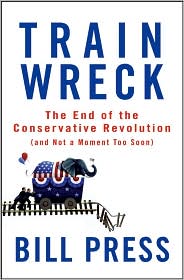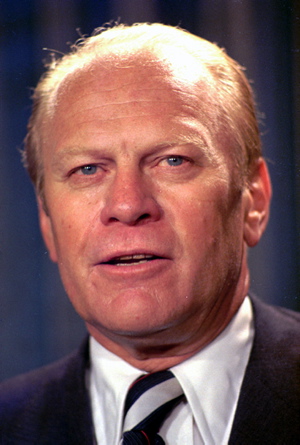A personal plug: Also out in stores this week, my fourth collaboration with Democratic pundit Bill Press (1, 2, 3): Trainwreck: The End of the Conservative Revolution (and not a moment too soon). If you couldn’t guess from the title, it basically argues that, just as the New Deal era lasted from 1932-1968, the Age of Conservatism that began in ’64 with Goldwater, hit its stride in the 70’s and 80’s, and gave us the likes of Reagan, Gingrich, and, of course, Dubya, has now hit the proverbial, inevitable, historical brick wall. So let’s survey the wreckage: On one hand, from Katrina to Abramoff and Ed Meese to Alberto Gonzales, right-wing attempts at governance over the past thirty years have usually degenerated into dismal experiments in cronyism and/or incompetence. On the other, conservatism has strayed so far from its ideological roots in the Reagan and particularly Dubya eras that the likes of Robert Taft, Russell Kirk, and William F. Buckley would never even recognize it. (Case in point, the Ron Paul candidacy, wherein a traditional Taft conservative ended up being treated by his esteemed Republican contemporaries in every debate as either a fringe joke or a terrorist-sympathizing dupe.) Either way, the right-wing ascendancy is over, and it’s our time again now (and, though it’s not reflected in this tome, I think y’all know who I’d prefer to be carrying our progressive standard into battle in 2009 and beyond…)
Tag: The Seventies
Meet Us in St. Louis.
“Thus did Barack Obama, in his campaign book ‘The Audacity of Hope,’ touch on a fundamental problem in today’s American politics: It’s too much about yesterday’s American politics. In too many ways, it’s still about Vietnam. It’s still about hardhats and hippies. It’s about Watergate and Iran-contra and Whitewater. It’s about the past. Barack Obama is aware of yesterday, but he is about today and tomorrow and next year. In a strong field of Democratic presidential contenders, he offers the best hope of transforming the debate and moving on to what America can be in the 21st century.“
The St. Louis Post-Dispatch endorses Barack Obama for president. “Comets don’t come around that often. In January of 1961, Ann Dunham Obama was six weeks pregnant with Barack Obama Sr.’s child when President Kennedy said at his inauguration that ‘the torch has been passed to a new generation.’ It’s that time again.”
Mitt’s Muskie Moment.
“I can remember when I heard about the change being made. I was driving home from — I think it was law school, but I was driving home — going through the Fresh Pond rotary in Cambridge, Massachusetts. I heard it on the radio and I pulled over and literally wept.” Regarding the thorny question of the Mormon church and race (discussed earlier here), Mitt Romney, to his credit, addressed the issue about as well as can be expected this morning during the Russert treatment on Meet the Press, even going so far as to tear up a little (Video). My, we’ve come a long way from the days of Ed Muskie. Update: Must be catching…Now Clinton’s crying too. Update 2: And Romney again.
“Hit them.”
Newly released papers from the 1972 election reveal more of the Nixon re-election campaign’s dirty tricks operation at work. “Nixon aides worked assiduously to plant negative stories, including one alleging [Dem VP candidate Sargent] Shriver‘s ancestors were slave-holders. An operative ‘is trying to get the story fed into certain segments of Black media and will give it to Black surrogates,’ an aide told Chuck Colson, Nixon’s chief counsel.” And, also among the new stuff, a detailed account of eventual White House whistleblower Alexander Butterfield‘s exasperation with Nixon’s dog, King Timahoe. ‘I think the miserable sessions I endured in Latin II as a high school sophomore were easier,’ he groused to Haldeman after meeting Nixon’s valet to discuss ‘doggie affairs.’” (Further excerpts.)
Steel yourself, America.
In a document dump of both exhilarating and terrifying proportions, the CIA announced it will release its “family jewels” next week: close to 700 pages of documents chronicling secret Agency activity from the fifties to the seventies. (A preview of what’s to come includes reports of detentions, wiretapping, surveillance, and other sordid current administration favorites.) “CIA Director Michael Hayden on Thursday called the documents being released next week unflattering, but he added that ‘it is CIA’s history.’ ‘The documents provide a glimpse of a very different time and a very different agency,’ Hayden told a conference of historians.” Hmm, we’ll see.
Sign of the Beast.
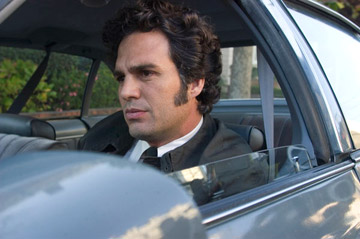 More a straightforward police procedural than the type of visually kinetic extravaganza one might expect from the director of Se7en and Fight Club, David Fincher’s Zodiac, which I saw on Friday, is a slow-moving but generally effective film. I confess to having very little interest in the story of the Zodiac killer, or in serial killer movies in general. Still, I found Zodiac to be a somber and engaging character study of the cops, journalists, and suspects caught up in the hunt for San Francisco’s most famous murderer, and a moody meditation on how, as months yield to years without a definitive answer, the long, tiring search for truth comes to haunt and drain their lives away. It may basically play like a seventies throwback Law and Order for most of its run, with occasional flourishes from The Wire, but Zodiac is still a worthwhile film, and one that marks a welcome rebound for Fincher after the relatively uninspired Panic Room. It’s good to see his sign rising once again.
More a straightforward police procedural than the type of visually kinetic extravaganza one might expect from the director of Se7en and Fight Club, David Fincher’s Zodiac, which I saw on Friday, is a slow-moving but generally effective film. I confess to having very little interest in the story of the Zodiac killer, or in serial killer movies in general. Still, I found Zodiac to be a somber and engaging character study of the cops, journalists, and suspects caught up in the hunt for San Francisco’s most famous murderer, and a moody meditation on how, as months yield to years without a definitive answer, the long, tiring search for truth comes to haunt and drain their lives away. It may basically play like a seventies throwback Law and Order for most of its run, with occasional flourishes from The Wire, but Zodiac is still a worthwhile film, and one that marks a welcome rebound for Fincher after the relatively uninspired Panic Room. It’s good to see his sign rising once again.
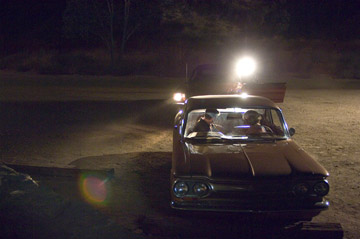 After the first of many impressive establishing shots of San Francisco, set to some spooky post-psychedelic pop ditty of the era, Zodiac begins on July 4th, 1969, with what feels like both a classic urban legend and a recipe for disaster — two young people flirting and fumbling at a dark and abandoned Lover’s Lane. Only this story is true, and soon enough, the Zodiac has struck for the second time, leaving one dead and another terribly wounded in his wake. Showing a penchant for publicity that will make him a household name in the Bay Area over the next few years, the Zodiac sends both boastful and encoded message to several major newspapers. These pique the interest of — among others — a hard-drinking, hard-living writer on the cop beat (Robert Downey, Jr.), a nebbishy cartoonist with a knack for puzzles (Jake Gyllenhaal, playing the author of the book on which the film is based), and two peace officers (Mark Ruffalo, Anthony Edwards) assigned to track down this preening sociopath before he strikes again. For the next few years, we follow each of these fellows as they attempt to pin down the identity of the elusive killer: negotiating bureaucratic snafus, parsing encrypted texts, and, yes, hitting the archives like good, little researchers. But the trail of the Zodiac exacts a heavy toll, and as the Age of Aquarius fades into the Reagan era, each of these men leave the decade scarred by their quest, some irreparably. And still, somewhere out there, the Zodiac lurks…
After the first of many impressive establishing shots of San Francisco, set to some spooky post-psychedelic pop ditty of the era, Zodiac begins on July 4th, 1969, with what feels like both a classic urban legend and a recipe for disaster — two young people flirting and fumbling at a dark and abandoned Lover’s Lane. Only this story is true, and soon enough, the Zodiac has struck for the second time, leaving one dead and another terribly wounded in his wake. Showing a penchant for publicity that will make him a household name in the Bay Area over the next few years, the Zodiac sends both boastful and encoded message to several major newspapers. These pique the interest of — among others — a hard-drinking, hard-living writer on the cop beat (Robert Downey, Jr.), a nebbishy cartoonist with a knack for puzzles (Jake Gyllenhaal, playing the author of the book on which the film is based), and two peace officers (Mark Ruffalo, Anthony Edwards) assigned to track down this preening sociopath before he strikes again. For the next few years, we follow each of these fellows as they attempt to pin down the identity of the elusive killer: negotiating bureaucratic snafus, parsing encrypted texts, and, yes, hitting the archives like good, little researchers. But the trail of the Zodiac exacts a heavy toll, and as the Age of Aquarius fades into the Reagan era, each of these men leave the decade scarred by their quest, some irreparably. And still, somewhere out there, the Zodiac lurks…
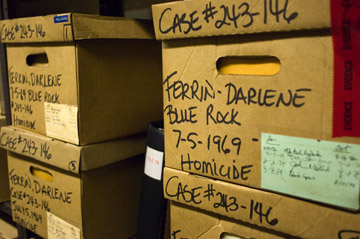 Its opening moments notwithstanding, most of Zodiac is concerned not with nasty serial killer exploits (although there are a few, such as a jarring afternoon picnic at the lake) but the ugly mechanics of the cops and journalists’ search, with all its circumstantial theorizing and bureaucratic gear-grinding. Some of this stuff, such as the memory-holes that arise between overlapping jurisdictions of various Bay Area law enforcement bureaus, would probably seem fresher if you’ve never watched The Wire, where police mismanagement and careerism is a central staple. (That being said, likable character actors like Elias Koteas, Donal Logue, and Zach Grenier spice up these scenes considerably.) But, other facets of the hunt still resonate, such as how multiple explanations pile up for a given clue with no real way to determine the correct one. The Zodiac’s symbol…is it a cross-hair, or was it stolen from a watch company, or is it the countdown from the opening of a film reel? Each answer seems like it must be the definitive one at different times, and, for the participants in this haunted search, the shifting interpretations grow increasingly maddening. The film is kind enough to give the audience something of a sense of closure at the end, but Zodiac is most intriguing when it leaves all doors open, and lets its characters get thrown about in the bruising wind that ensues.
Its opening moments notwithstanding, most of Zodiac is concerned not with nasty serial killer exploits (although there are a few, such as a jarring afternoon picnic at the lake) but the ugly mechanics of the cops and journalists’ search, with all its circumstantial theorizing and bureaucratic gear-grinding. Some of this stuff, such as the memory-holes that arise between overlapping jurisdictions of various Bay Area law enforcement bureaus, would probably seem fresher if you’ve never watched The Wire, where police mismanagement and careerism is a central staple. (That being said, likable character actors like Elias Koteas, Donal Logue, and Zach Grenier spice up these scenes considerably.) But, other facets of the hunt still resonate, such as how multiple explanations pile up for a given clue with no real way to determine the correct one. The Zodiac’s symbol…is it a cross-hair, or was it stolen from a watch company, or is it the countdown from the opening of a film reel? Each answer seems like it must be the definitive one at different times, and, for the participants in this haunted search, the shifting interpretations grow increasingly maddening. The film is kind enough to give the audience something of a sense of closure at the end, but Zodiac is most intriguing when it leaves all doors open, and lets its characters get thrown about in the bruising wind that ensues.
Nixon versus the Diplomats.
Also among the intriguing recent disclosures of the Nixon years are newly released State Department records which reveal further Nixon’s contempt for his Foreign Service. “Just before saying he was going ‘to take the responsibility for cleaning up’ the department, the president told Kissinger on November 13 that he was determined that ‘his one legacy is to ruin the Foreign Service. I mean ruin it — the old Foreign Service — and to build a new one. I’m going to do it.’“
Model Ford.
“As President, my primary concern must always be the greatest good of all the people of the United States whose servant I am. As a man, my first consideration is to be true to my own convictions and my own conscience. My conscience tells me clearly and certainly that I cannot prolong the bad dreams that continue to reopen a chapter that is closed. My conscience tells me that only I, as President, have the constitutional power to firmly shut and seal this book.” Gerald Ford, 1913-2006.
He was not a crook — No, really!
“The Nixon Library has a history of extreme politicization — the library has seldom hosted serious historians, who tend to be at least somewhat critical of Nixon, more typically showcasing assorted Nixon apologists and right-wing pundits — and so the imminent transfer remains worrisome.” Historian David Greenberg explains how, over thirty years after Watergate and on the eve of finally joining the official presidential library system, the Nixon Library is still trying to resuscitate its namesake’s image, to the detriment of sound history.
Republican Publicans.
“More alarming were Richard Nixon’s last years at the White House. After a good many evening martinis, he would call Henry Kissinger, and the secretary of state would grin silently as he passed around the telephone so that others could listen to their commander in chief’s unbalanced ramblings. Since Nixon was in a position to blow us all up, this suggests a somewhat esoteric sense of humor on Kissinger’s part.” With the fall of Britain’s Charles Kennedy, Slate‘s Geoffrey Wheatcroft very briefly surveys the sordid history of alcoholism in politics. (He could, I think, have done more with The Alcoholic Republic.)

